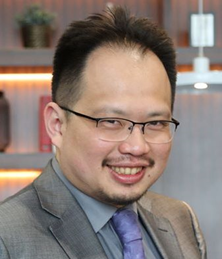Keynote Speaker

Victor Chang
Professor, Aston Business School, Aston University, UKSpeech Title: The Innovative Internet of Medical Things and Machine Learning (ML) Algorithms for Diabetes, Cancer and Healthcare Analysis
Abstract: This keynote proposes an e-diagnosis system based on machine learning (ML) algorithms to be implemented on the Internet of Medical Things (IoMT) environment, particularly for diagnosing diabetes mellitus (type 2 diabetes) and breast cancer analysis. It can also be further adapted for heart disease detection analysis. The ML applications tend to be mistrusted because of their inability to show the internal decision-making process, resulting in slow uptake by end-users within certain healthcare sectors. This research delineates the use of three interpretable supervised ML models: Naïve Bayes classifier, random forest classifier, and J48 decision tree models to be trained and tested using the Pima Indians diabetes dataset. The performance of each algorithm is analyzed to determine the one with the best accuracy, precision, sensitivity, and specificity. An assessment of the decision process is also made to improve the model. It can be concluded that a Naïve Bayes model works well with a more fine-tuned selection of features for binary classification, while random forest works better with more features. IoMT is then used to help analyzing breast cancer and other medical analysis. Other methods such as support vector machine (SVM) and its variant models using the radial basis function kernel outperformed all other models we tested and those previously developed by others, achieving an accuracy of 99%. Additional scientific research for heart disease detection. We explain our analysis, research contributions and impacts. In summary, this keynote will present the latest research outputs for using applied IoMT and machine learning algorithms for healthcare domains.
Biography: Prof. Victor Chang is a Professor of Business Analytics at Operations and Information Management, Aston Business School, Aston University, UK, since mid-May 2022. He was previously a Professor of Data Science and Information Systems at the School of Computing, Engineering and Digital Technologies, Teesside University, UK, between September 2019 and mid-May 2022. He has deep knowledge and extensive experience in AI-oriented Data Science and has significant contributions in multiple disciplines. Within 4 years, Prof Chang completed Ph.D. (CS, Southampton) and PGCert (Higher Education, Fellow, Greenwich) while working for several projects simultaneously. Before becoming an academic, he has achieved 97% on average in 27 IT certifications. He won 2001 full Scholarship, a European Award on Cloud Migration in 2011, IEEE Outstanding Service Award in 2015, best papers in 2012, 2015 and 2018, the 2016 European award: Best Project in Research, 2016-2018 SEID Excellent Scholar, Suzhou, China, Outstanding Young Scientist award in 2017, 2017 special award on Data Science, 2017-2022 INSTICC Service Awards, Talent Award Suzhou 2019, Top 2% Scientist 2017/2018, 2019/2020 & 2020/2021, the most productive AI-based Data Analytics Scientist between 2010 and 2019, Highly Cited Researcher 2021 and numerous awards mainly since 2011. He is ranked number 2 in distributed computing and number 42 in AI globally based on top 2% Scientists 2020 from Stanford University. Prof Chang was involved in different projects worth more than £14 million in Europe and Asia. He has published 3 books as sole authors and the editor of 2 books on Cloud Computing and related technologies. He published 1 book on web development, 1 book on mobile app and 1 book on Neo4j. He gave 32 keynotes at international conferences. He is widely regarded as one of the most active and influential young scientist and expert in IoT/Data Science/Cloud/security/AI/IS, as he has the experience to develop 10 different services for multiple disciplines. He is the founding conference chair for IoTBDS, COMPLEXIS and FEMIB to build up and foster active research communities globally with positive impacts.
